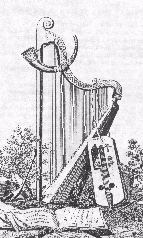|
             
Copyright
Helen Forder
2004
|
|

|
|
'By the Roman invasion, and
the more barbarous incursions of the Saxons, the Danes and the Normans, and
the emigration of the Britons to Armorica (1); by the frequent destruction of MSS (2), and the
massacres of the Clergy (3), and the Bards; the Poetry and Music of Wales have
suffered a loss, that has thrown a dark cloud over the history of those
native arts, and for a long time threatened their total extinction. Yet
from the memorials still extant, and the poetical and musical compositions
which time has spared, we are enabled often to produce unquestionable
evidence, and always to form a probable conjecture, concerning their rise
and progress among us. There is no living nation that can produce works of
so remote antiquity, and at the same time of such unimpeached authority as
the Welsh.' [NOTES]
From An Historical
Account of the Welsh Bards and their Music and Poetry; Musical and Poetical
Relicks of the Welsh Bards, by Edward Jones.
|
|
'[The Welsh] play three
instruments, the harp, the pipe and the crwth ...'
'When they play their instruments they charm and delight the ear with the
sweetness of their music.'
'When they come together to make music, the
Welsh sing their traditional songs, not in unison, as is done elsewhere,
but in parts, in many modes and modulations. When a choir gathers to sing,
which happens often in this country, you will hear as many different parts
and voices as there are performers, all joining together in the end to
produce a single organic harmony and melody in the soft sweetness of
B-flat.'
From The Description of
Wales, by Gerald of Wales, translated by Lewis Thorpe.
|

Illustration
from Musical and Poetical Relicks of the Bards by Edward Jones
|
|
'If you want to know whether
the Welsh are a substantive historic race, go and listen to their music.'
W.E.Gladstone (on Snowdon,13th
September 1892)
'Wales is pre-eminently the land of
song; in no other country in the world has poetry and music entered so
largely into the national life of its inhabitants.'
Both excerpts from Cambrian
Minstrelsie, edited and harmonised by Joseph Parry, Mus. Doc.
(Cantab.)
|
|
'Welsh music is essentially
harp music, and exhibits in almost every phrase evidence of the influence
of the instrument upon its development ...'
'... the late director of the Brussels Royal Academy of Music, in his
History of Music, thus refers to the antiquity of the Welsh, and their
music. "In Gaul as well as in the country of the Welsh nation,
there were priests who were called Druids, who celebrated their mysterious
rites in the forests, and bards or musical priests who sang the glory of
Heroes. But there is the difference between Gaul and the country of the
Welsh, inasmuch as the latter still preserve their bards, and that the
Cambrian or Celtic language is still cultivated by them, and moreover that
their music still maintains its primitive type. There is something
remarkable in this now interminable succession of Welsh bards for two
thousand years, and that the preservation intact of their language and
their Celtic music, in a country so long ruled over by the Saxons.'' '
From the Preface to The
Songs of Wales, edited by Brinley Richards. 1873.
|
|
Read an essay by John Thomas (Pencerdd Gwalia) on
The National Music
of Wales
|
|
